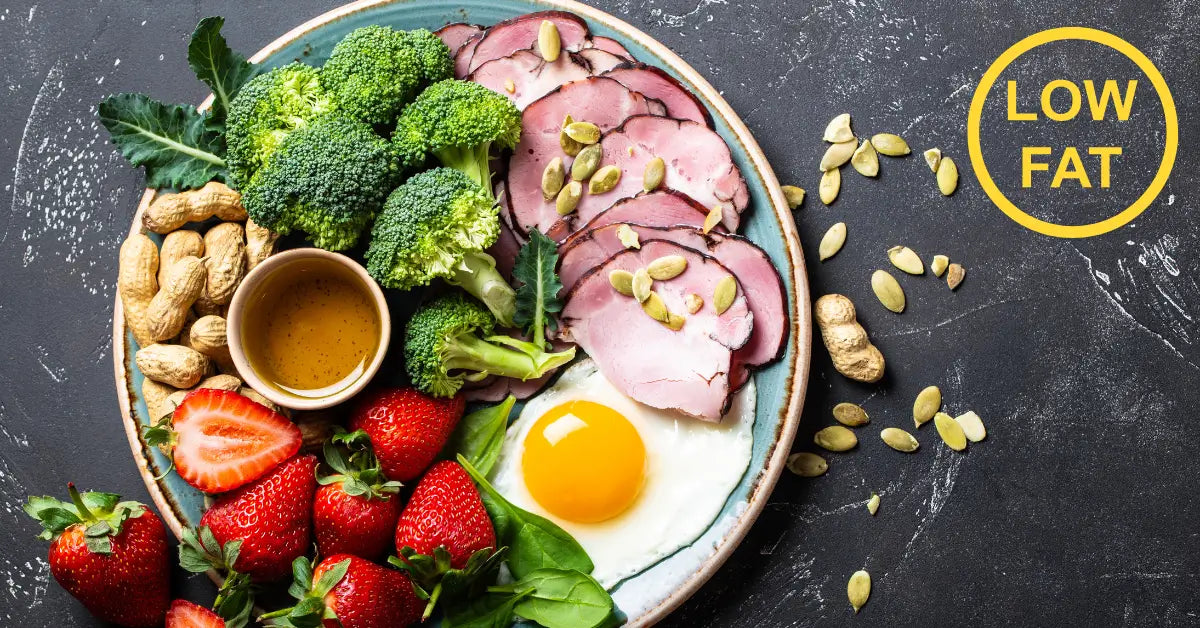In case you missed the headlines towards the end of 2023, Andropause - also known as male menopause or Manopause was front and centre as the phenomenon of low testosterone levels. It is impacting millions of men globally and has started to achieve the recognition it deserves. You can see how the NHS is discussing male menopause and taking it seriously.
It’s increasingly common - impacting men at much earlier ages than the previous generations. It is due to poor lifestyle choices and environmental toxins amongst other factors driving the decline further.
In this blog we’re going to look specifically at the role diet plays in testosterone levels. Let’s dig in.
Let's Look At The Facts
Testosterone deficiency occurs when a male’s body doesn't produce enough serum testosterone. Though exercise and weight loss can combat this deficiency. A study published in The Journal of Urology suggests that the type of diet matters too. The new study finds that men following a low-fat diet may have lower serum testosterone levels than those with different diets.
“We found that men who adhered to a fat-restrictive diet had lower serum testosterone than men on a nonrestrictive diet,” said Dr. Jake Fantus, of the University of Chicago Medical Center, in Illinois.
About Testosterone Deficiency (TD)
Scientists have linked testosterone deficiency to a variety of health issues:
There are also links between low testosterone and chronic conditions such as high blood pressure and type 2 diabetes. Low testosterone levels may also contribute to certain types of cancer.
The Latest Research
There’s more evidence on a weekly basis that is showing how vital testosterone is to men’s health and longevity.
The links are clear that weight reduction helps increase a man’s testosterone levels. It is however still unclear why exactly this is, which is why the researchers behind the study decided to investigate.
They began by assessing the effects of four diets on testosterone:
- Low-fat diet - As defined by the American Heart Association (AHA)
- Mediterranean diet - Which involves a high intake of fruits, vegetables, and whole grains and a minimal intake of animal protein and dairy products, and thus animal fats.
- Low-carbohydrate diet, as defined by the AHA.
- Non restrictive diet - The researchers analysed data sets from the National Health and Nutrition Examination Survey. The relevant data had been collected during three periods: 1999–2000, 2003–2004, and 2011–2012.
For the survey, men aged 18–80, submitted a 2-day dietary history and underwent serum testosterone testing. Overall, the researchers analysed data from 3,128 men. While 457 men from this group had followed a low-fat diet. On the other hand, 764 had followed a Mediterranean diet, only two had followed a low-carbohydrate diet. The researchers therefore excluded this diet from their analysis.
The Findings That Tell You The Value To Increase Testosterone
The mean serum testosterone level for the entire cohort was roughly 435.5 nanograms per deciliter (ng/dl)
Men on a low-fat diet had an average serum testosterone level of 411 ng/dl. Those on a Mediterranean diet had an average of 413 ng/dl. Taking into consideration other factors that can influence testosterone (age, physical activity, and body mass index) the researchers determined that the Mediterranean diet did not cause a significant reduction in testosterone, whereas the low testosterone levels associated with a low-fat diet were small but significant.
The study admits that “The clinical significance of small differences in serum [testosterone] across diets is unclear,” and acknowledges that “Future prospective research is required to corroborate these findings and elucidate the mechanisms by which restrictive dieting may affect serum [testosterone].”
The authors conclude that men with obesity may view a potential slight reduction in serum testosterone to be a relatively minor consideration in comparison with the potential benefits of a low-fat diet.
Ideally, we would like to see a few more studies to confirm our results,' said Joseph Whittaker at the University of Worcester. 'However, these studies may never come, normally researchers want to find new results, not replicate old ones. In the meantime, men with low testosterone would be wise to avoid low-fat diets.'
Bertie Stringer Head of Nutrition DNA comments:
Whilst this is a really interesting study and its helpful to raising awareness of the global issue of low T impacting one in four men, I feel that the benefits of weight loss on testosterone levels has been slightly lost by focussing on the low fat element.
The fact is that obesity is directly negatively impacting testosterone levels of men globally and it's getting worse every year. With obesity levels at an all time high and testosterone levels at an all time low, there is a direct correlation on the size of men's waistlines to their serum T levels."
The Health Survey for England 2019 found that around ¾ of men aged between 45-74 are overweight and 27% are obese. Overweight men produce more oestrogen due to an enzyme in our fat cells called aromatase which converts testosterone to oestrogen. This direct reduces the amount of available testosterone levels and creates hormonal havoc.The fatter you are, the more oestrogen you produce and the more oestrogen you produce the fatter you get. Rather a catch 22 for modern men.
A 2007 study of 1,667 men ages 40 and above found that each one-point increase in BMI was associated with a 2% decrease in testosterone. Therefore the most effective solution is to reduce weight and fat levels in order to optimise hormonal levels and reap the wider health benefits of being an optimal weight.
The best diet to increase testosterone includes good fats, supporting the evidence from the latest study.

"The body requires fats, especially healthy saturated ones to increase testosterone and optimal hormone health"

Cholesterol is a precursor to many important steroid hormones including testosterone. While too much cholesterol isn’t a good thing, the body needs some cholesterol to run at its best as the building block of all hormones is fat. Therefore if you remove all sources from your diet, it becomes a problem. "The body requires fats, especially healthy saturated ones, for optimal hormone health and balance" says Bertie.
WIn Conclusion
Men need to be mindful of what they eat on a daily basis impacts their hormone product either negatively or positively. As testosterone is produced on a 24 hour cycle, men need to be aware of this on a daily basis. If your diet is devoid or too low of fat or not including the right fats, your chemical production of testosterone will be negatively impacted. Men need to ensure that their nutrition plan has enough quality proteins, beneficial fats, good testosterone boosters and nutrient-dense vegetables to support hormonal balance and avoid nutrient deficiencies.
DNA offers a range of supplements which have been strategically developed to support testosterone levels and maintain a healthy hormone balance in men of all ages. Take our online symptoms checker to discover whether you would benefit from supplementing your diet.






Share:
What are normal Testosterone levels for Modern Men?
DNA's Guide to Testosterone Supplements and T-Boosters.